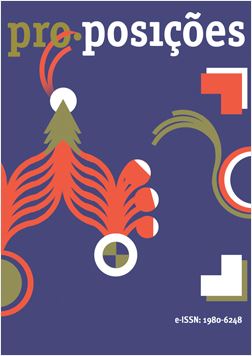Abstract
During the textual profusion derived from Gutenberg’s press, Comenius and Montaigne elaborated pedagogical reflections that, more or less evidently, take the diversity of opinions and interpretations as an object and propose different ways to deal with it. The former tries to neutralize it by reinforcing the divine word as the only one and, hence, the reference to define what is important inside schools, whereas the latter proposes “experiencing the world” and the power of this variety to provide more modest and responsible outlines to what is known. This study aims to describe these viewpoints to reflect on how they may contribute to discuss contemporary classroom, which is also crossed by multiple discourses (whether true or not) originated from digital technologies.
References
Bauman, Z. (2001). Modernidade líquida Zahar.
Calvino, I. (1993). Por que ler os clássicos? (Nilson Moulin, trad.). Companhia das Letras.
Chartier, R. (1999). A aventura do livro Editora UNESP.
Chartier, R. (2009). As práticas da escrita. In História da vida privada, v. 3: da Renascença ao Século das Luzes. Companhia das Letras.
Comenius. (2011). Didática Magna (Ivone Castilho Benedetti, trad.). WMF Martins Fontes.
Compagnon, A. (2014). Uma temporada com Montaigne WMF Martins Fontes.
Coppi, L. A. C. (2021). Uma pedagogia menor: reflexões sobre o acaso, a incerteza e o gesto de desmobilizar em Educação [Tese de doutorado em Cultura, Filosofia e História da Educação, Faculdade de Educação, Universidade de São Paulo] Biblioteca Digital de Teses e Dissertações da USP. doi:10.11606/T.48.2021.tde-28062021-193534
Eby, F. (1976). História da educação moderna: teoria, organização e práticas educacionais (Maria Ângela Vinagre de Almeida, Nelly Aleotti Maia, Malvina Cohen Zaide, trad.). Globo.
Han, B.-C. (2017). Agonia de Eros Vozes.
Han, B.-C. (2014). En el enjambre Herder.
Heller, A. (1982). O homem do Renascimento Presença.
Larrosa, J. (2014). Escritos sobre experiência Autêntica.
Lipovetsky, G. (2005). A era do vazio: ensaios sobre o individualismo contemporâneo Manole.
Lipovetsky, G., & Serroy, J. (2011). A cultura-mundo: resposta a uma sociedade desorientada (Maria Lúcia Machado, trad.). Companhia das Letras.
Meirieu, P. (2010). Frankenstein, educador LAertes.
Montaigne, M. (2009). Les Essais Gallimard.
Montaigne, M. (2002). Os ensaios: vol. I Martins Fontes.
Montaigne, M. (2006). Os ensaios: vol. II Martins Fontes.
Moura, R. S. (2014). Finitude, “frequentação do mundo” e formação humana em Michel de Montaigne. Educação & Realidade, 39(4), 1169-1184. http://educa.fcc.org.br/pdf/rer/v39n04/v39n04a12.pdf
Pariser, E. (2012). O filtro invisível: o que a internet está escondendo de você. Zahar.
Postman, N. (1999). O desaparecimento da infância (Suzana Menescal de Alencar Carvalho, José Laurentino de Melo, trad.). Graphia.
Postman, N. (1993). Technopoly: the surrender of the culture to the technology Vintage Books.
Sibila, P. (2016). O show do eu Contraponto.
Velho, G. (1978). Observando o familiar. In E. D. O. Nunes, A aventura sociológica Jorge Zahar.

This work is licensed under a Creative Commons Attribution-NonCommercial 4.0 International License.
Copyright (c) 2023 Pro-Posições


